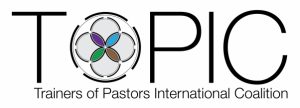Theological Foundations
CONSENSUS ON THEOLOGICAL FOUNDATIONS for TOPIC (Trainers of Pastors International Coalition)
TOPIC members are committed to the truthfulness and authority of the Bible, to salvation only through personal faith in Jesus Christ, and to the Church, which is God’s instrument for the continuing ministry of the Lord Jesus Christ in human society.
Members of TOPIC are united in a commitment to the Lordship of Jesus Christ and the growth and health of His church as identified in Matthew 16:18, where He says “. . . upon this rock I will build my church.” Ecclesiology is the sector of theology most concerned with the emphases of TOPIC. Thus these elements are set forth as the foundations of theological consensus:
- The church is identified as the “body of Christ,” a spiritual relationship of those whose lives are identified in faith with the death, burial, and resurrection of Jesus Christ.
- The church is not an organization in the ordinary models of human enterprise and institution. Instead, it is a fellowship of peers in the kingdom of God, servants–all, disciples–all.
- The church is committed to the spiritual development of the people of God. Those who are chosen to lead within a congregation are to be exemplary in belief and behavior, with lives that display the work of the Holy Spirit.
- A local congregation is a faith community of those participating together in the work of Christ, relating themselves to one another as a spiritual family and to the world around them as a collective and personal representation of the justice and mercy of God.
VARIETIES OF MINISTRIES
Many educators and ministry specialists share a deep concern for equipping and assisting those who are functionally engaged in tasks of pastoral leadership. Three sectors of persons and organizations are represented in TOPIC. All of these are engaged in training and development of pastors and ministers in leadership service in the church.
SECTOR 1- Congregation-based: For this sector of TOPIC membership, the central agency and the major site for experiences of leadership development is the church itself. Thus the strategies and procedures of leadership formation begin with ecclesiological concepts of the nature of the church and its role in the redemptive work of God. Development of the people of God is seen as including the recognition that the entire community of faith shares responsibilities for leadership.
SECTOR 2 – Campus-based: The major concern and activity of this group is for the effective expansion, refinement, and utilization of the institutions, which serve to
prepare persons for Christian ministry. The motivating belief of these ministerial specialists and educators is that the history of the church demonstrates God’s willingness to utilize organized educational institutions as an orderly and reliable instrument of education and training for pastoral leadership. Acknowledgment of the historical and traditional worth of the institutions of schooling causes leaders in this sector to invest in the extension and media-related expansion of the institutional forms.
SECTOR 3 – Alternative Catalytic Models: This sector represents persons and agencies whose conception of the purpose and means of leadership development begins with a purposive, pragmatic, and practical delivery of the “basic essentials” of Christian knowledge, skills and character formation for effective pastoral leadership and ministry. The organizational projects in this sector demonstrate various efforts to break with the slowness and self-justification sometimes evident in traditional approaches to pastoral leadership development. The sector represents many entrepreneurial strategies of ministry organizations that are responding to the challenging need for large-scale preparation of pastoral leadership, especially focused on geopolitical regions of rapid church growth.
CONSENSUS ON RESPECT AND COOPERATION
All three sectors of emphasis are accepted as worthy and valid historically, practically, and theologically. Thus accepting the worth of one another’s ministry is an essential basis for cooperation within the affiliation. TOPIC members are pledged to minimize disparaging comments and harmful competition, which can arise among those engaged in diverse ministries in and for the church. Accordingly, TOPIC serves as a forum for interaction and sharing of experiences and discoveries toward the glorification of God, the health of the church, and the advancing of Christ’s work in the world through the equipping of pastoral leaders for effective ministry.
